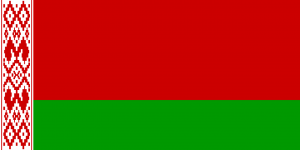Language/Belarusian/Grammar/Negation
Hi Belarusian learners! 😊
In this lesson, we will be focusing on negation. Negation in the Belarusian language means creating a negative statement that contradicts the affirmative. For example: "I do not speak Belarusian" vs "I speak Belarusian". By the end of the lesson, you will be able to construct negative sentences in Belarusian and understand how to use them.
With the completion of this lesson, consider investigating these related pages: Prepositions, Gender, Questions & Infinitives.
Negation with "НЕ"[edit | edit source]
In Belarusian, negation is done by using the particle "не" (ne). "Не" negates the word following it. This particle can be used at the beginning, the middle, or the end of the sentence.
For example, if you want to say "I do not speak Belarusian", it would be "Я не гавору па-беларуску" (Ya ne havoru pa-belarusku). "Не" is placed before "гавору" (havoru) to negate it. Another example: "мне не падабаецца" (mne ne padabayetsa), which means "I do not like it". Here, "не" is before "падабаецца" (padabayetsa).
Negative Verbs[edit | edit source]
Verbs in the negative form in Belarusian are preceded by the particle "не". Here are some examples of verb negation with "не":
| Belarusian | Pronunciation | English |
|---|---|---|
| Я не разумею. | Ya ne razumeyu. | I don't understand. |
| Мы не пішам. | My ne pisham. | We are not walking. |
| Ён не працуе. | Yon ne pratsue. | He does not work. |
| Ты не здасць экзамен. | Ty ne zdascts ekzamen. | You are not passing the exam. |
"НЕ" vs "НІ"[edit | edit source]
In some cases, "не" is mistakenly used instead of "ні" (ni). There is a significant difference between these two negatives in Belarusian grammar. "Не" is to negate a verb or a noun while "ні" is used to exclude something. For example: "Я хачу цукерку а не лімон" (Ya khachu tsukerku a ne limon), which means "I want a candy, not a lemon". Here "не" is used to negate "лімон" (limon), and "а" (a) is used to mean "but" or "rather".
"НІ"[edit | edit source]
"Ні" (ni) is a negative particle that is used in different contexts. It is not used to negate verbs, but rather to decline the continuation of a sentence. For example: "Ці складана праўда, ці ж звычайная легенда? Ні тое, ні іншае." (Tsi skladana prauda, tsi zh zvychajnaya liehenda? Ni toye, ni inshaye.), which means "Is it a complicated truth or a simple legend? Neither one nor the other". In this case, "ні" (ni) is used to indicate that neither is correct.
Negation with Personal Pronouns[edit | edit source]
If you want to negate something related to a person, you can use personal pronouns. Here are some examples:
| Belarusian | Pronunciation | English |
|---|---|---|
| Ніхто не здарэнне. | Nikhto ne zdarennye. | Nobody is perfect. |
| Мой бацька не п'е. | Moy batska ne pie. | My father does not drink. |
| Я не люблю яблыкі. | Ya ne liubliu iablyki. | I do not like apples. |
Note that in Belarusian, personal pronouns used in negative sentences are generally not followed by a verb. The reason is that verbs in negative sentences are already preceded by "не".
Practice[edit | edit source]
Here are some sentences to practice negative forms in Belarusian. Translate them into English:
- Я не магу гэтага зразумець. (Ya ne mahou hetaha zrazumets).
- Ты не быў тут учора? (Ty ne biu tут uchora?)
- Ён не любіць малако. (Yon ne liubits malako).
- Мы не хочам глядзець тэлевізар. (My ne khocham hliadzets tėlevizor).
- Што ты не разумееш? (Shto ty ne razumeiesh?)
Dialogues[edit | edit source]
Here are some dialogues to practice negative sentences in Belarusian. Each of these dialogues includes a pronunciation guide and an English translation.
- Person 1: "Ты любіш тварог з гарэлкай?" (Ty liubish tvaroh z harelkai?) - Do you like cottage cheese with vodka?
- Person 2: "Не, дзякуй." (Ne, dziakui.) - No, thank you.
- Person 1: "Ты гуляеш з намі завтра?" (Ty huliayesh z nami zaўtra?) - Are you going to hang out with us tomorrow?
- Person 2: "Ні, мне трэба працаваць." (Ni, mne treba pratsavats.) - No, I have to work.
Culture and Interesting Facts[edit | edit source]
- Belarusian is the official language of Belarus, and Russian is also widely spoken in the country. - One famous Belarusian writer is Francysk Skaryna, who translated the Bible into Old Belarusian in the 16th century. - Belarusians celebrate "Kalyady" (Каляды) as their traditional Christmas Eve. It is celebrated by having a feast with 12 different dishes, one for each apostle. - Another traditional Belarusian holiday is "Kupalle" (Купалле), which is celebrated on the summer solstice. It includes rituals involving water and fire, such as dunking in rivers and jumping over bonfires.
To improve your Belarusian Grammar, you can also use the Polyglot Club website. Find native speakers and ask them any questions!
Sources[edit | edit source]
Other Lessons[edit | edit source]
- Pronouns
- Possessive Pronouns
- Future Tense
- Gender
- Nouns
- Adjectives
- Personal Pronouns
- Prepositions
- Give your Opinion

